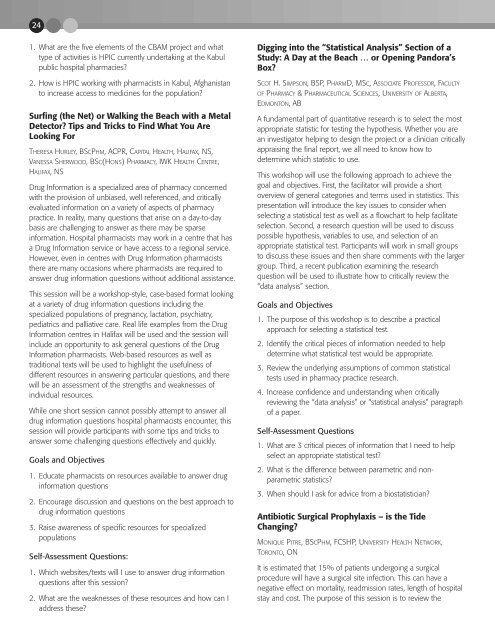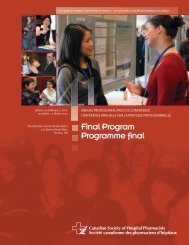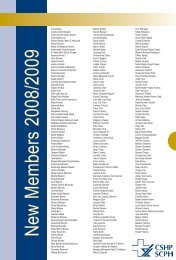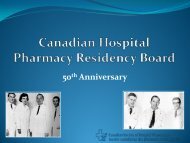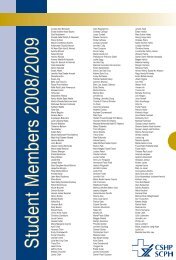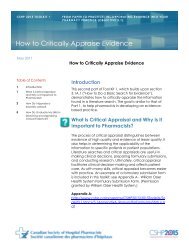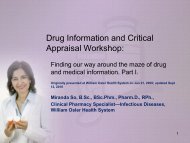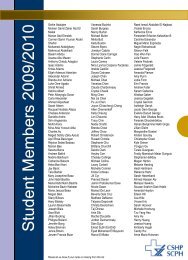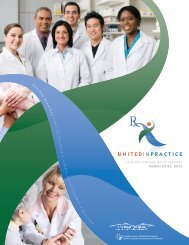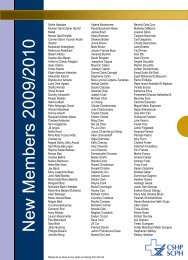Final Program - Canadian Society of Hospital Pharmacists
Final Program - Canadian Society of Hospital Pharmacists
Final Program - Canadian Society of Hospital Pharmacists
Create successful ePaper yourself
Turn your PDF publications into a flip-book with our unique Google optimized e-Paper software.
24<br />
1. What are the five elements <strong>of</strong> the CBAM project and what<br />
type <strong>of</strong> activities is HPIC currently undertaking at the Kabul<br />
public hospital pharmacies?<br />
2. How is HPIC working with pharmacists in Kabul, Afghanistan<br />
to increase access to medicines for the population?<br />
Surfing (the Net) or Walking the Beach with a Metal<br />
Detector? Tips and Tricks to Find What You Are<br />
Looking For<br />
THERESA HURLEY, BSCPHM, ACPR, CAPITAL HEALTH, HALIFAX, NS,<br />
VANESSA SHERWOOD, BSC(HONS) PHARMACY, IWK HEALTH CENTRE,<br />
HALIFAX, NS<br />
Drug Information is a specialized area <strong>of</strong> pharmacy concerned<br />
with the provision <strong>of</strong> unbiased, well referenced, and critically<br />
evaluated information on a variety <strong>of</strong> aspects <strong>of</strong> pharmacy<br />
practice. In reality, many questions that arise on a day-to-day<br />
basis are challenging to answer as there may be sparse<br />
information. <strong>Hospital</strong> pharmacists may work in a centre that has<br />
a Drug Information service or have access to a regional service.<br />
However, even in centres with Drug Information pharmacists<br />
there are many occasions where pharmacists are required to<br />
answer drug information questions without additional assistance.<br />
This session will be a workshop-style, case-based format looking<br />
at a variety <strong>of</strong> drug information questions including the<br />
specialized populations <strong>of</strong> pregnancy, lactation, psychiatry,<br />
pediatrics and palliative care. Real life examples from the Drug<br />
Information centres in Halifax will be used and the session will<br />
include an opportunity to ask general questions <strong>of</strong> the Drug<br />
Information pharmacists. Web-based resources as well as<br />
traditional texts will be used to highlight the usefulness <strong>of</strong><br />
different resources in answering particular questions, and there<br />
will be an assessment <strong>of</strong> the strengths and weaknesses <strong>of</strong><br />
individual resources.<br />
While one short session cannot possibly attempt to answer all<br />
drug information questions hospital pharmacists encounter, this<br />
session will provide participants with some tips and tricks to<br />
answer some challenging questions effectively and quickly.<br />
Goals and Objectives<br />
1. Educate pharmacists on resources available to answer drug<br />
information questions<br />
2. Encourage discussion and questions on the best approach to<br />
drug information questions<br />
3. Raise awareness <strong>of</strong> specific resources for specialized<br />
populations<br />
Self-Assessment Questions:<br />
1. Which websites/texts will I use to answer drug information<br />
questions after this session?<br />
2. What are the weaknesses <strong>of</strong> these resources and how can I<br />
address these?<br />
Digging into the “Statistical Analysis” Section <strong>of</strong> a<br />
Study: A Day at the Beach … or Opening Pandora’s<br />
Box?<br />
SCOT H. SIMPSON, BSP, PHARMD, MSC, ASSOCIATE PROFESSOR, FACULTY<br />
OF PHARMACY & PHARMACEUTICAL SCIENCES, UNIVERSITY OF ALBERTA,<br />
EDMONTON, AB<br />
A fundamental part <strong>of</strong> quantitative research is to select the most<br />
appropriate statistic for testing the hypothesis. Whether you are<br />
an investigator helping to design the project or a clinician critically<br />
appraising the final report, we all need to know how to<br />
determine which statistic to use.<br />
This workshop will use the following approach to achieve the<br />
goal and objectives. First, the facilitator will provide a short<br />
overview <strong>of</strong> general categories and terms used in statistics. This<br />
presentation will introduce the key issues to consider when<br />
selecting a statistical test as well as a flowchart to help facilitate<br />
selection. Second, a research question will be used to discuss<br />
possible hypothesis, variables to use, and selection <strong>of</strong> an<br />
appropriate statistical test. Participants will work in small groups<br />
to discuss these issues and then share comments with the larger<br />
group. Third, a recent publication examining the research<br />
question will be used to illustrate how to critically review the<br />
“data analysis” section.<br />
Goals and Objectives<br />
1. The purpose <strong>of</strong> this workshop is to describe a practical<br />
approach for selecting a statistical test.<br />
2. Identify the critical pieces <strong>of</strong> information needed to help<br />
determine what statistical test would be appropriate.<br />
3. Review the underlying assumptions <strong>of</strong> common statistical<br />
tests used in pharmacy practice research.<br />
4. Increase confidence and understanding when critically<br />
reviewing the “data analysis” or “statistical analysis” paragraph<br />
<strong>of</strong> a paper.<br />
Self-Assessment Questions<br />
1. What are 3 critical pieces <strong>of</strong> information that I need to help<br />
select an appropriate statistical test?<br />
2. What is the difference between parametric and nonparametric<br />
statistics?<br />
3. When should I ask for advice from a biostatistician?<br />
Antibiotic Surgical Prophylaxis – is the Tide<br />
Changing?<br />
MONIQUE PITRE, BSCPHM, FCSHP, UNIVERSITY HEALTH NETWORK,<br />
TORONTO, ON<br />
It is estimated that 15% <strong>of</strong> patients undergoing a surgical<br />
procedure will have a surgical site infection. This can have a<br />
negative effect on mortality, readmission rates, length <strong>of</strong> hospital<br />
stay and cost. The purpose <strong>of</strong> this session is to review the


